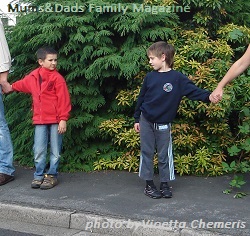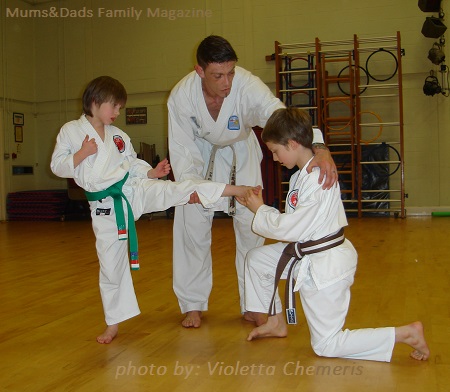Adam’s Tale

Young children are frequently impulsive. One of the most important developments in early childhood is the onset of the capacity to control ourselves and ultimately, achieve self-control and discipline. This is different from the control which is imposed by outsiders like parents and teachers. As children grow into independence, the opportunities to impose discipline diminish dramatically. So without self-control, there is sometimes no control at all, resulting in impulsive behaviour which can have unforeseen consequences.
The problem behaviours exhibited by some young adults would have been more easily dealt with when they were children within a supportive family. If young children aren’t helped to control their temper tantrums, it becomes much more difficult to provide the necessary support when they are teenagers. Some parents like to make their children feel good at any cost. Unfortunately, over indulgence can result in ‘spoiled’ children, unable to appreciate someone else’s viewpoint or exercise self-control. Other parent recognise self-control as one of the most important qualities a child can develop. Ironically, spoiled children are not always happy and fulfilled, while children who develop self-control often are. Certainly, self-control is a quality that will help children succeed in the formal education system, and later, in many aspects of their employment and social lives. Over time, self-control should grow into a willingness to do the right things, even when no one else is watching
Most children need far more guidance than punishment. When they behave in ways that we think are inappropriate it may be because they haven’t yet developed the skills of being  independent and self-controlled. Undoubtedly they need the sympathetic guidance of caring adults to develop those characteristics. If, parents and adults always tell them how to think, what to do, and what decisions to make, they simply become dependent on others. On the other hand, if we never set boundaries for them, they probably won’t learn how to set limits for their own behaviour, make appropriate choices or learn how to accept the rules our society requires us to follow.
independent and self-controlled. Undoubtedly they need the sympathetic guidance of caring adults to develop those characteristics. If, parents and adults always tell them how to think, what to do, and what decisions to make, they simply become dependent on others. On the other hand, if we never set boundaries for them, they probably won’t learn how to set limits for their own behaviour, make appropriate choices or learn how to accept the rules our society requires us to follow.
We know that children learn by imitating what they experience. From the beginning, parents are their role models. If children live with examples of independent people who make rational choices, follow rules, believe in themselves, act unselfishly, care about other people and have values and beliefs which they explain to their children, then those are the traits they will recognise and imitate. If not, then they may well retain selfish and impulsive behaviour into adolescence and beyond.
I remember watching a very skilled and sympathetic teacher helping a group of 10 year olds who had little experience of animals, understand how they might handle some of the school pets without startling or hurting them. It was a wonderful example of learning how to put yourself in someone else’s position and appreciate things from a perspective other than your own. A first step, perhaps, in developing an understanding of ourselves in relation to other people and appreciating how our actions impinge on others, which are the foundations of self-control.
Self-control means that sometimes we have to give up things we like in order to do something else. When a parent calls a child, a shout of “What?” from another room or the bottom of the garden, might be deemed inappropriate. Children can learn to come to their parent, so that a comfortable conversation can take place. Equally, when a child shouts “Dad!” from the garden, we will have to be prepared to respond in the same way.
Most of us don’t like to be corrected, and children can respond in angry or insolent ways. Both are opportunities to foster self-control. Sometimes everyone has to follow directions which they may not like. Explaining why this is so might help children to respond with more positive attitudes and controlled behaviour. This helps children learn to control their initial impulses. When that understanding begins to reflect itself in changes to their responses, then we should recognise and praise their growing maturity enthusiastically.
Many social skills require self-control. Listening to other people, taking turns, sharing, being careful, knowing when and how to interrupt, controlling temper, being polite, reporting back after completing a task, all provide opportunities to reward and praise children on their increasing self-control. Praising children when they demonstrate such qualities and helping them to get better at the things they are not so good at will help move them on towards developing independent self-control.
 We can encourage children to engage in activities and responsibilities which depend on self- control. Playing sports, playing an instrument, making a collection, caring for a pet or some plants, assisting with household tasks, helping younger children, keeping a tidy bedroom and many other activities, will help to develop self-control and acceptance of responsibility. We can also encourage persistence, or ‘stickability’. When our daughters were very young we agreed they could join Brownies, but they had to promise to ‘go until Christmas’, (3 months away), before they decided whether they liked it or not. Both achieved the Queen’s Guide award as teenagers!
We can encourage children to engage in activities and responsibilities which depend on self- control. Playing sports, playing an instrument, making a collection, caring for a pet or some plants, assisting with household tasks, helping younger children, keeping a tidy bedroom and many other activities, will help to develop self-control and acceptance of responsibility. We can also encourage persistence, or ‘stickability’. When our daughters were very young we agreed they could join Brownies, but they had to promise to ‘go until Christmas’, (3 months away), before they decided whether they liked it or not. Both achieved the Queen’s Guide award as teenagers!
When praising and rewarding children for their achievements, a star on a chart, a ’smiley’ in a school book or a thank you from Granny for being helpful, we have an opportunity to link their achievements to the issues of self-control. “I think you are one of the most helpful people I’ve met!” “I’ve noticed how gentle you are when you feed the rabbit.” “It was good that you were determined to finish the walk even though you were very tired.” “You did really well not to lose your temper when John did that to you!”
Family routines, household tasks, and family timetables all provide opportunities for children to take responsibility and show self-discipline. The rewards for being responsible are called privileges. The child who is responsible enough to be ready and at breakfast by 7:30 might earn the privilege of reading for an extra half hour before lights out. Helping in the garden might earn the privilege of choosing some of the flowers to grow. Clearing the table might attract the privilege of choosing what we have for tea tomorrow. We hope that children begin to learn to associate their privileges with the acceptance of responsibility and their exercise of self- control.
Schools are currently under pressure to teach a curriculum geared towards outcomes measured in test results and justified by the need to provide an employable workforce for commerce and industry. Recently, the Secretary of State indicated that there should be a hierarchy of subjects, with those he believes to be the most rigorous and useful at the top of the list. Unfortunately, the subjects which enable children to experience, express and understand their own feelings, impulses and emotions in relation to those of others, are found at the end of it, and the understandings developed by those subjects are the roots from which self-control develops.
Many years ago, Sir Alec Clegg suggested that children might on the one hand learn the dates of the Kings and Queens of England, or on the other, encounter the visions of greatness or evil which history presents. They might learn the botanical classifications of the rose on the one hand, or appreciate its colour, shape and scent on the other. They might understand the science of how to make a bomb or wonder at the callousness required to kill people with it. He then comments:
“Now the facts of history, the classification of the rose and the physics of the bomb can all be learned and the effectiveness of that learning can be tested and reported on. Appreciating the visions of greatness, the scent of the rose, and the callousness required to use a bomb, cannot.”
All adults must decide for themselves which of the two hands are most important. Most parents would want their children to have opportunities to experience the latter three; to learn how other people felt and expressed their feelings, and to express in words, music, paint, drama and dance, their reactions to their own experiences. For all parents, the challenge is to recognise the difficulties the education system currently has in dealing with the unmeasurable aspects of human experience. Then go on to create something extremely positive in their own families to ensure their children grow up as caring people, in control of themselves. Perhaps then, tragedies like the one experienced by Adam’s family will become, if not a thing of the past, at least not a major issue of our future.’







